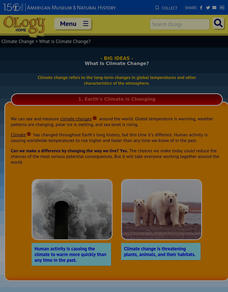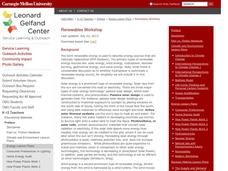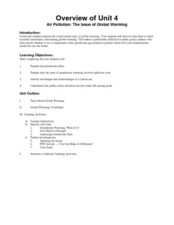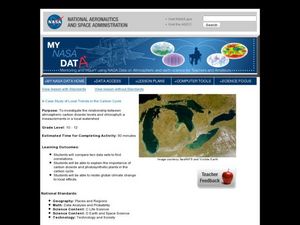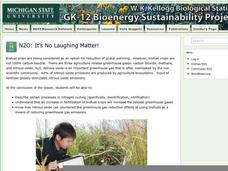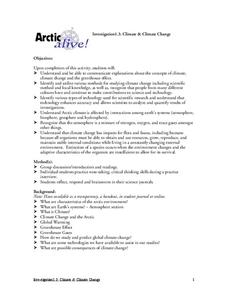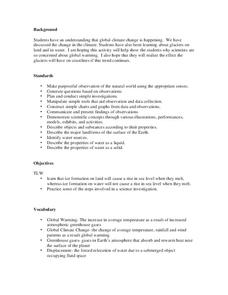Colorado State University
Why Does it Get Colder on a Clear Night than a Cloudy Night?
Clouds are nature's insulator! A lab investigation asks learners to use an infrared thermometer to measure differences in infrared temperatures. They find that pointing the thermometer at a cloud has a much different result than pointing...
Curated OER
Reflecting on Reflectivity
Students plan and construct a "mini-lab" to measure the reflectivity of different earth surfaces. They measure reflectivity of materials, including ice, soil, rocks, etc., and then extrapolate from what they have learned to consider the...
Curated OER
Venus Unveiled
Young scholars debate the validity of predictions about the greenhouse effect.
Curated OER
Global Warming: Writing and Editing a Research Report
Bring environmental issues into your classroom! Practice writing and peer editing research reports on global warming and the greenhouse effect. Middle schoolers can work on their research skills, their writing skills, and how to...
American Museum of Natural History
What Is Climate Change?
So many factors show that climate change has arrived. Learners read through an online resource that explains the data and the consequences of climate change. They also review strategies for slowing or even reversing the global influence.
Curated OER
Predicting the Future
Students examine how scientists predict the effects of global climate change. In this environmental science lesson, students participate in a discussion about using computer generated data to create climate predictions. Students examine...
Curated OER
The Carbon Converters
For this environmental science worksheet, students will read several paragraphs about greenhouse gases and the role trees play in clearing carbon dioxide from the air. Then students will use data about carbon dioxide stored in trees to...
Chicago Botanic Garden
Personal Choices and the Planet
How big is your footprint? Activity three culminates the series by having groups complete carbon footprint audits with people in their schools and/or around the districts. Groups then gather their data, create a presentation including...
Carnegie Mellon University
Renewables Workshop
Youngsters examine resource maps to find out which states are using solar and wind power and discuss as a class various other renewable energy sources. They use a provided data table to record pros and cons to each technology, build and...
Curated OER
Air Pollution: The Issue of Global Warming
Here is an outstanding 10-page lesson plan on global warming. Learners discover that there is a lot of controversy surrounding this topic in that the science behind global warming is difficult to prove. The best thing about this plan is...
Curated OER
Diurnal Temperature Changes and Water Vapor Content
High schoolers examine the greenhouse effect, as they determine how moisture in the air affects the diurnal temperature range. Their investigation help them to explain different climatological regimes of both the Southern Great Plains...
Curated OER
Case Study of Local Trends in the Carbon Cycle
Students examine the relationship between chlorophyll and carbon dioxide in the atmosphere. In this investigative lesson students study the local effects of climate change.
Space Awareness
Oceans as a Heat Reservoir
Oceans absorb half of the carbon dioxide and 80 percent of the greenhouse gases released into the atmosphere. Scholars learn how and why the oceans store heat more effectively than land and how they help mitigate global warming. Pupils...
WK Kellogg Biological Station
N2O: It’s No Laughing Matter!
While the layout of the lesson is not very detailed and the link to the PowerPoint is no longer valid, there are some great exercises to examine the role of nitrous oxide in the environment. For middle level learners, the resource listed...
Curated OER
Greenhouse Effect
Students identify greenhouse gases. They explain why perfluorocarbons are a bad alternative to chlorofluorcarbons. They determine both the least and most influential greenhouse gases.
Population Connection
The Carbon Crunch
Carbon is in the air; should we care? Teach the class why it is important to pay attention to carbon levels and how the world population and various countries across the globe affect the carbon levels in the atmosphere. High schoolers...
Curated OER
Environment: Climate Change
Young scholars explore climate change and the greenhouse effect. Using provided definitions, they assess local weather conditions and analyze long term climatic data for their areas. Once they explore the concept of and connection...
Curated OER
Climate Change
Students compare weather data and draw conclusions. In this climate change lesson plan, students determine whether data collected over a period of ninety years shows a warming trend.
Curated OER
Getting to the Core of Climate Change
Students investigate climate changes by graphing and analyzing ice core data from Greenland and Antarctica. They create, explain and report the pattern of data on a graph of ice core data. In addition they find relationships between the...
Curated OER
Global Climate Change
Second graders investigate the effect of melting glaciers to sea level. For this earth science lesson, 2nd graders simulate the process in the lab by conducting an experiment using ice cubes and clay. They explain the consequences of...
Curated OER
Turn off your Engines!
Students explore how idling vehicles contribute to the greenhouse gas emissions and climate change. They conduct a survey of idling in their community. Students calculate and develop corresponding graphs of the carbon dioxide produced...
Curated OER
Campus Greenhouse Gas Emissions Inventory
Students brainstorm the campus links to global warming. Students pick topics for individual or group research. Students develop a research plan. Students keep good records and report their progress. Students report findings both...
Curated OER
Personal Emissions Calculator
Students complete the personal emissions grid and review information on carbon footprints. Using directions, they create their own emissions calculator and determine how much carbon dioxide they emit in a given period of time. They...
Wild BC
Bearly Any Ice
After reviewing food chains, your class members participate in an arctic predator-prey game that exemplifies the impact of climate change of food availability. If you are in a hurry, skip this lesson, but if you have the time to...






